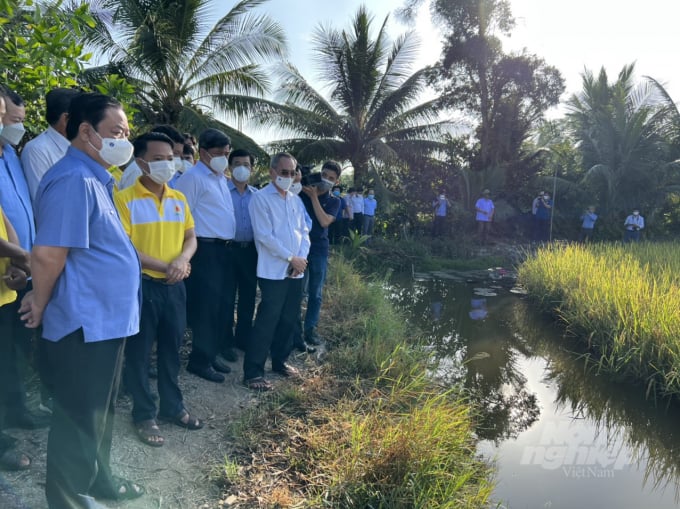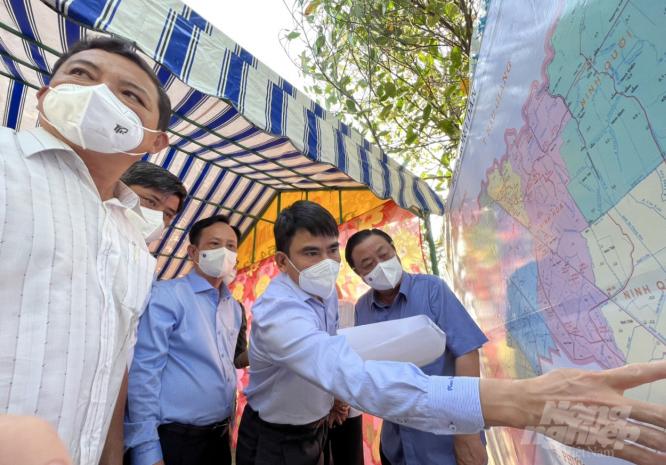May 24, 2025 | 16:25 GMT +7
May 24, 2025 | 16:25 GMT +7
Hotline: 0913.378.918
May 24, 2025 | 16:25 GMT +7
Hotline: 0913.378.918

Minister of Agriculture and Rural Development Le Minh Hoan and leaders of Bac Lieu province visited a rice-shrimp model in Hong Dan district. Photo: Trong Linh.
On February 10, Minister Le Minh Hoan and the Ministry of Agriculture and Rural Development delegation visited a shrimp-rice model in Ninh Quoi A commune, Hong Dan district, Bac Lieu province.
Sharing with cooperatives, businesses, and leaders of Bac Lieu province, Minister of Agriculture and Rural Development Le Minh Hoan said that: Restructuring agriculture and building a new rural are the revolution in farmers' production reorganization. That is the revolution through the cooperative economy, in which the cooperative is an indispensable element. There is no other way than the production link.
Therefore, the Minister of Agriculture and Rural Development suggested that localities must cooperate in production with three mottos: Link - cooperation - market (cooperate and link producers in the same industry, career; linking farmers with enterprises, letting enterprises lead the market, according to market criteria, using the market to decide on production).
The rice shrimp model in Bac Lieu province is mainly concentrated in Phuoc Long and Hong Dan districts. In addition to the main rice varieties used previously, such as ST24, ST25, Fragrant Dai 8, OM18, OM5451. Two districts also tested new rice varieties such as CXT30 and BLR413 in the 2021-2022 rice crop to adapt to local climate change conditions.
Mr. Luu Hoang Ly, Director of Bac Lieu Department of Agriculture and Rural Development, said: Bac Lieu province has transformed production, especially developing a rice production model in shrimp farming areas (rice - shrimp areas). In the first stage of conversion in 2000, the production area under this model was still insignificant, about 12,856 hectares (farmers spontaneously cultivated about 5,861 hectares); and farmers have faced too many difficulties with producing.

Minister Le Minh Hoan and Secretary of the Bac Lieu Provincial Party Committee Lu Van Hung share farming practices with farmers, cooperatives, and businesses. Photo: Trong Linh.
At first, there were many opinions that this production model could not be expanded due to the intercropping of shrimp and rice. Therefore, it was challenging to implement technical measures applicable to shrimp and rice, especially disputes over saltwater for shrimp farming and freshwater for rice cultivation.
According to Mr. Ly, in implementing the transformation to shrimp - rice model, Bac Lieu province has gradually invested in infrastructure, reasonable water regulation, propagated technical training and replicated the model for farmers. Thereby, rice-shrimp farming areas have increased yearly (in 2015, whole areas were 29,607 hectares, an increase of 16,751 hectares compared to 2000; in 2021, whole areas reached 39,404 hectares, an increase of 10,000 hectares compared to 2015).
The shrimp-rice model is evaluated by scientists and experts as an efficient, sustainable, environmentally friendly production model and adapts to climate change. It is a sustainable development model. The profit is 15 - 30% higher than the rice monoculture (in 2019, the income is VND 50 million/hectare/year, in 2021 it will reach VND 120 - 130 million/hectare/year).
Especially after each shrimp crop, the organic humus, microorganisms, and excess food of the shrimp are a good source of nutrients for rice plants. On the contrary, the land is improved after the rice crop, and the environment is favorable, so shrimps overgrow, with fewer risks and diseases.
Sharing with Minister Le Minh Hoan, Mr. Huynh Van Thon, Chairman of Loc Troi Group, said: Currently, the Group is implementing close production linkages with cooperatives in the Mekong Delta in the rice cultivation, including the rice-shrimp production model.

In recent years, Bac Lieu province has invested in many irrigations works for agriculture production. Photo: Trong Linh.
Accordingly, Loc Troi Group focuses on supporting and transferring technology, changing practices to farmers from cooperation, and sharing profits. In particular, the Group sets the development strategy of not owning land but producing large quantities based on closer links with cooperatives.
"In the past, cultivating large fields was unsuccessful due to lax management, now we do it more efficiently by establishing cooperatives," said Mr. Thon.
Mr. Nguyen Van Phong, Director of An Khang Agricultural Service Cooperative, said: The Cooperative was established in July 2020, has 49 members with a charter capital of VND 79 million, is expected to increase charter capital in the coming year.
An Khang Agricultural Service Cooperative currently specializes in providing safe and effective crop management services and solutions, providing agricultural services, production, and consumption services for the Cooperative's members and the community.
Intending to produce high-quality, sustainable, and environmentally-friendly rice cultivation, the Cooperative cooperates with businesses to organize input services, technical guidance, and product consumption for members and farmers.
An Khang Agricultural Service Cooperative has actively cooperated with Loc Troi Group to organize production cooperation. Accordingly, Loc Troi Group will supply input materials and ensure the product output. In 2021, the Cooperative, in association with Loc Troi Group, implements two models for members to select and compare effectiveness to each other.
Translated by Ha Phuc

(VAN) In the tranquil wetlands of Van Long, there are quiet souls who guard the forests, nurture the waters, and oversee every bird and troop of langurs as protecting the essence of a living heritage.

(VAN) WWF, GIZ, IUCN, UNDP call for biodiversity conservation and sustainable development must be regarded as a unity in strategies for a green future.

(VAN) On celebration of International Day for Biological Diversity, Deputy Minister Nguyen Quoc Tri called for practical actions to address nature and biodiversity conservation.

(VAN) Dr. Hoang Thi Thanh Nhan – Deputy Director of the Nature and Biodiversity Conservation Agency – highlighted this on the International Day for Biological Diversity, May 22, 2025.
![Ho Chi Minh city adapts to climate change: [2] Accelerating action](https://t.ex-cdn.com/nongnghiepmoitruong.vn/608w/files/chiqk/2025/05/22/4024-4220-bien-doi-khi-hau-1-100626_766.jpg)
(VAN) Clearly recognizing the challenges posed by climate change, Ho Chi Minh city has swiftly shaped its policies and implemented practical solutions to adapt.

(VAN) Rice straw is no longer just a discarded byproduct, but it is becoming a green resource that helps farmers in the Mekong Delta reduce emissions and promote circular, sustainable agriculture.

(VAN) Other Effective Area-based Conservation Measures (OECMs) are solutions that contribute effectively to achieving the goals of the Kunming–Montreal Global Biodiversity Framework.